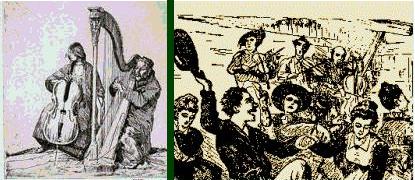Many of the the tunes I accompany or play were composed by a lone singer, fiddler, harpist, or other instrumentalist and performed without harmonic accompaniment since centuries ago. Without that tradition, maintained by poor folk with bare subsistence day jobs, we wouldn't have that body of music.
Is it wrong to accompany them with a line or chord sequence that was not a part of that melody's original single-line tradition?
Is it wrong to combine different tunes into medleys? Different tunes from different countries or eras?
What of using classical Common Practice Era conventions to compose original introductions, bridges, modulations, vamps, inversions in bass lines, counter-melodies, and parallel harmonies?
What of applying modern jazz/rock/pop-derived chords, rhythms, riffs, and "grooves"?
Electronic effects? Synthesizers? Looping machines? Is it all OK? Is the David Downes' highly-produced PBS "Celtic Woman" extravaganza of "She Moved Through the Fair" with synthesizers, back-up chorus, 60-piece orchestra, and smoke machines still a traditional folk song as it stands alongside "Somewhere" from West Side Story and "Someday" from the Disney animated Hunchback of Notre Dame? At what point does the healthily functioning gag reflex prompt a frantic self-protective lunge for the remote control?
At New Year's Camp I watched a workshop on Celtic guitar (sadly, I don't play guitar) by Mary of Banshee in the Kitchen! followed by a workshop by all the members of Banshee in the Kitchen! on how they come up with their arrangements. My hope was to get inspiration for bringing some ideas into the music I play with the little local group. Brenda acknowledged right off that some folks are not comfortable with arrangements; some even disapprove of accompaniment, yet alone arrangements.
Indeed, I have heard one person express the feeling that Banshee in the Kitchen! over -arranges. I don't agree, my background and evolved taste appreciates imaginative, colored, sometimes surprising, sometimes subtle variations in both melody and accompaniment. But a part of me does understand reverence for the centuries-old minimalist tradition. Long may it also continue.

Old World or New, Sacred or Profane
Subscribe to:
Post Comments (Atom)
2 comments:
I am not familiar with Banshee in the Kitchen, but love what Rushad Eggleston/Crooked Still and Abby Newton do with folk/Celtic music.
I took a workshop with Rushad at Maine Fiddle Camp and learned the rudiments of "chops and grooves" cello accompaniment. Then I went over to join a group of fiddlers, but the teacher, a traditional player, would not let me play a Rushad-style accompaniment, so I just played traditional fiddle with them. My local fiddle group is more receptive--I just need to find time to improve my accompaniment techniques. I enjoy reading your blog on these issues.
I am not so interested in the Celtic Woman, approach, but to each his or her own!
Marilyn (I play cello, flute, and fiddle in various amateur ensembles, mostly folk, fiddle, early, classical)
Marilyn, it's good to have you here.
I hope I was clear on my point. I'm saying that by the time productions get so elaborate and watered-down as Celtic Woman, it makes me gag.
Post a Comment